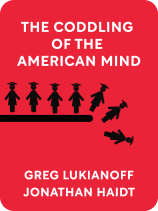

This article is an excerpt from the Shortform book guide to "The Coddling of the American Mind" by Greg Lukianoff and Jonathan Haidt. Shortform has the world's best summaries and analyses of books you should be reading.
Like this article? Sign up for a free trial here .
In the book The Coddling of the American Mind, what is the untruth of emotional reasoning? Why do Jonathan Haidt and Greg Lukianoff say that you’re better off trusting logic and reason than your emotions?
In their book, co-authors Jonathan Haidt and Greg Lukianoff name three untruths that have gained a strong foothold among young people, especially those on college campuses. The second of the three untruths is the untruth of emotional reasoning, or always trusting your emotions and gut instinct.
Keep reading to learn why the authors say emotional reasoning is a bad idea.
Untruth #2: Always Trust Your Emotions
In this article, we’ll explore the second of the three Great Untruths: the untruth of emotional reasoning. Specifically, we’ll look at:
- How emotional reasoning distorts our picture of reality
- How feedback loops of negative thinking can cause us to form unrealistically gloomy views of ourselves and the world around us, and how campus discourses around oppression and microaggressions encourage this type of harmful thinking
- How emotional reasoning leads students to aggressively shut down or cancel speaking events on campus—limiting the diversity of viewpoints available to all members of the university community
The Rider and the Elephant
Our picture of reality is actually deeply shaped by our emotions. Our perceptions derive much more from how our minds interpret what we see, rather than from an objective and rational assessment of reality. A metaphor for thinking about the human mind is of a human rider sitting atop an elephant.
The rider, representing reason, can do her best to attempt to direct the elephant. But the elephant, representing emotion, is far more powerful and has its own will; it will only comply with the rider’s commands if those commands are not in conflict with its desires.
The elephant (emotion) governs our unconscious, automatic thought processes. Too often, however, this sort of emotional reasoning causes us to misperceive the world around us. For young people, emotional reasoning can cause them to feel intentional slights where there are none and strengthen the desire to shelter themselves from emotionally triggering experiences—even speech that they merely disagree with.
(Shortform note: Want to learn more about the interaction between emotion and reason? Read our summary of The Happiness Hypothesis.)
Negative Feedback Loops
Emotional reasoning often leads to negative cognitive feedback loops. Individuals who suffer from anxiety and depression often start from a place of low self-esteem. Because they have such low self-esteem, they selectively seek out “proof” to confirm these negative beliefs.
One way they do this is through catastrophizing, turning minor setbacks into disasters.
Another symptom is generalization: taking one setback and re-casting it as a comment on one’s entire experience in life. A third symptom is mind-reading, assuming (nearly always falsely) that others have a negative opinion of them, without any proof.
These “proofs,” in turn, further reinforce the original negative beliefs. People suffering from depression cherry-pick negative experiences and discount positive interactions in order to fuel their negative self-image, in which they are deeply emotionally invested.
Cognitive Behavioral Therapy
Emotional reasoning is totally at odds with what modern psychology says about healthy thinking. Cognitive behavioral therapy (CBT) challenges patients to consciously question their ingrained patterns of negative thinking. Practitioners encourage patients to label these thoughts as they happen and identify more positive (and realistic) ways of interpreting the events in their lives.
This disrupts the pattern of negative thinking. Thus, instead of thinking, “I’m stupid and worthless and doomed to a life of failure” after performing poorly on a test, a patient undergoing cognitive therapy might reorient their thinking toward something more along the lines of “It was just one test; it doesn’t define my life.” Over time, the patient’s automatic thought patterns become more positive. CBT can be remarkably effective at breaking the negative mental model.
(Shortform note: If you’re interested in learning more about CBT, read our summary of Cognitive Behavior Therapy: Basics and Beyond.)
The Threat to Critical Thinking
Alarmingly, these patterns of negative thought are strikingly similar to the ways in which overprotected university students interpret speech or ideas with which they disagree.
In a college American literature class, for example, students might be asked to read Mark Twain’s The Adventures of Huckleberry Finn, a novel that famously features characters using anti-black racial slurs that were common in everyday parlance at the time it was written, in the 19th century.
Twain was not attempting to promote white supremacy by having his characters use these words—he was merely accurately representing the speech of the real people he encountered in his travels along the Mississippi River during the antebellum era. The novel and the characters in it represent a window into how Americans of the time thought about race. Thus, it is a legitimate work for students to explore in a college setting.
But a student who objects to the racial slurs in the book might demonstrate negative thinking by overgeneralizing and labeling, assuming that Twain and the professor who assigned the book are racists. The student might go even further and feel that the entire university is biased against her and that the assignment of the book renders her learning environment unsafe and hostile.
Not only is this disruptive in a classroom setting, but it also inhibits the development of critical thinking—the skill that enables people to absorb new information and revise incorrect beliefs.
If you believe that the mere presence of ideas with which you disagree constitutes an existential threat to you, you will never be able to grapple with those ideas and grow intellectually.

———End of Preview———
Like what you just read? Read the rest of the world's best book summary and analysis of Greg Lukianoff and Jonathan Haidt's "The Coddling of the American Mind" at Shortform .
Here's what you'll find in our full The Coddling of the American Mind summary :
- The "three Untruths" that have taken hold of young people
- The damage that "speech codes" cause on college campuses
- How colleges are increasingly seeing students as customers






